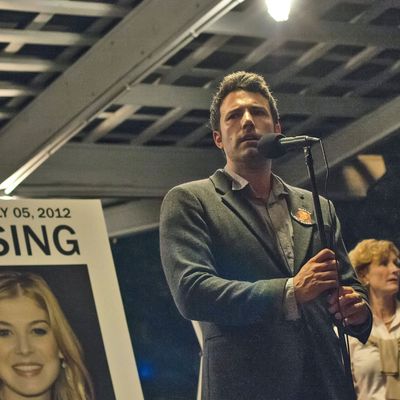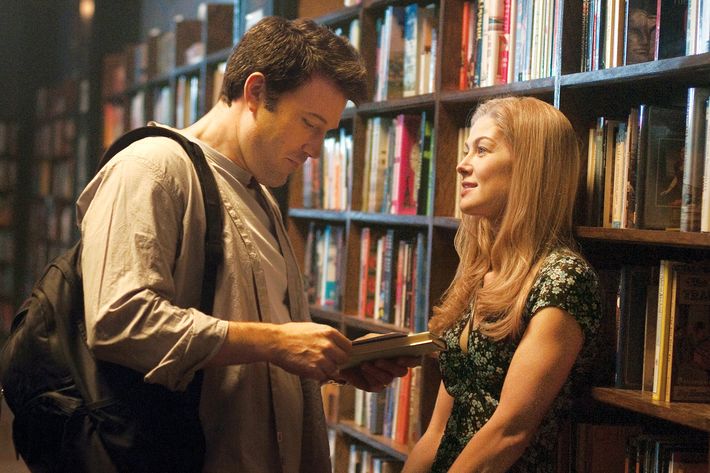
One thing our critics agree about Gone Girl: It’s definitely a David Fincher movie. From analyzing it in light of his past works to describing how he visually and psychologically manifests the book’s dark themes, critics agree that Fincher’s hand is all over the film. In fact, a number of reviewers went so far as to describe it as a perfect union of director and material. As Genevieve Koski writes over at the Dissolve: “Gone Girl reveals itself as an optimal meeting of the minds, a perfect amalgam of a writer and a director with complementary fixations.” Here’s what else the critics are saying about this dark and twisted trip to “Fincherland”:
Superbly cast from the two at the top to the smallest speaking parts, impeccably directed by Fincher and crafted by his regular team to within an inch of its life, “Gone Girl” shows the remarkable things that can happen when filmmaker and material are this well matched. Fincher, whose work can be gratuitously disturbing (“Seven”) as well as formally impressive (“The Social Network”), is by nature a chilly director, a temperament that meshes well with the unsettlingly bleak view of human nature that “Gone Girl” is all about. —Kenneth Turan, L.A. Times
Surgically precise, grimly funny and entirely mesmerizing over the course of its swift 149-minute running time, this taut yet expansive psychological thriller represents an exceptional pairing of filmmaker and material, fully expressing Fincher’s cynicism about the information age and his abiding fascination with the terror and violence lurking beneath the surfaces of contemporary American life. —Justin Chang, Variety
In Se7en and Fight Club, Fincher proved his suave mastery of film violence; in Zodiac, his way of clarifying the many clues in a murder thriller. As he showed in The Social Network, the director also knows that no wound is more toxic than a friend’s betrayal. There will be blood in Gone Girl, but some of the most startling moments are glancing — Amy’s quick kiss that includes a lip bite — and claustrophobic. What can be more ominous than the proximity of two people who are supposed to be in love but may have murder in mind? —Richard Corliss, Time
Flynn’s writing is lyrical but biting, her novel functioning as much as an incisive psychological, and sociological, study as a missing-person mystery. Adapting her own novel, Flynn has handed Fincher a knotty, sophisticated script to work with, and together they make something at one dense and agile, a stylish thriller that bores deep. —Richard Lawson, Vanity Fair
At first blush, “Gone Girl” is natural Fincherland. Not geographically; he seems less absorbed in North Carthage, described by Amy as “the navel of the country,” than he was in the California of “Zodiac” or the Harvard of “The Social Network.” Those are his masterpieces: the two movies that I can’t not watch when they turn up on TV, and the two occasions on which his pedantry and his paranoia have fused together, engrossing us in a crazed aggregation of detail. Nothing could equip him better for the coiled and clustered goings on in the new film, and, for good measure, he has hired Trent Reznor and Atticus Ross, whom he last used for “The Girl with the Dragon Tattoo,” to compose the score. They don’t let him down. “Gone Girl” boasts one major act of savagery, drenched in a downpour of blood, and what we hear during it sounds like the wah-wah pedal of Satan. —Anthony Lane, New Yorker
Fincher and his cinematographer, Jeff Cronenweth, shoot their characters from just below eye level. The angles aren’t extreme—just slanted enough to catch the ceilings, to suggest how hemmed in these people are by circumstance and stupid choices and a house (the production design is by Donald Graham Burt, the spooky astral music by Trent Reznor and Atticus Ross) that’s like purgatory in beige. Actors seem constricted anyway in Fincher’s films. They’re made to speak their smart-ass dialogue at a brisk clip, with no Method dawdling. In this case, the effect on Affleck’s acting is remarkable. —David Edelstein, New York
Conducting it all like a true-crime Toscanini is Fincher—a mischievious maestro who turns the film into the puzzle-box workout that his 1997 brainteaser The Game wanted to be. — Chris Nashawaty, Entertainment Weekly
“Gone Girl,” the latest from that dark lord of cinema, David Fincher, opens with a man softly talking about his wife’s head. The image of his hand caressing a woman’s sleek blond hair in close-up indicates that it’s a lovely head, a lovely wife, too. Yet the violence of his words — he speaks of cracking her skull open and “unspooling” her brain — wakens an unease that trembles throughout this domestic horror movie. Those familiar with Mr. Fincher’s work may wonder, perhaps with a shudder or a conspiratorial smile, whether this head will share the fate of another head belonging to another pretty wife, a gift that was boxed and delivered in one of the hellish circles girdling his shocker “Seven.” — Manohla Dargis, New York Times
In his best films, for instance “Zodiac,” Fincher is able to take the material and create something that brings the underlying themes bubbling to the foreground. And while “Gone Girl” is certainly his slightest film to date, it’s nonetheless undeniably gripping. Fincher clearly enjoys turning the screws and rounding the wild corners of the plot from the first frame. —Kevin Jagernauth, The Playlist
But the biggest star here may be Fincher’s surgically precise insight and silky style of suspense, which makes this film a modern companion to such classics as Hitchcock’s “Vertigo” and Clouzot’s “Diabolique.” Fincher is a fearless filmmaker who understands his audience’s intelligence (not to mention their cinematic blood lust). By the end of “Gone Girl,” we feel like we’ve lived through about four movies, not just one. Good luck letting go of any of them. —Joe Neumaier, New York Daily News
Fincher’s sinister slickness and dimly-lit precision has sometimes been considered a double-edged sword, a complaint that strikes me as missing the point. Mastery isn’t a negative. —Jake Coyle, Associated Press
David Fincher’s Gone Girl presents a succession of shimmering surfaces, each more seductive and opaque than the last. That’s not the only way in which this film (adapted by Gillian Flynn from her own best-selling novel) could be said to resemble its title character, the mysteriously missing Amy Elliott Dunne (Rosamund Pike). Amy is polished, perfectionistic, coolly cerebral, and sometimes startlingly cruel. So is Fincher’s ninth film, a deliciously manipulative mystery that toys with the viewer like a femme fatale with her prey. —Dana Stevens, Slate
Mysteries aren’t based in clues and facts, they’re based in motivation, and unpacking a character’s hidden motivations—through gestures, looks, and tics—is where Fincher excels as a notoriously meticulous filmmaker, and Flynn as a shrewdly withholding storyteller. —Genevieve Koski, the Dissolve
I hated his Girl with the Dragon Tattoo, but I usually like the negativity in the dark, clammy subterranean ozone where Mr. Fincher bases his creepiest films (Se7en, Fight Club and the uniquely original Curious Case of Benjamin Button). The pointless Gone Girl is nothing more than an annoying case of showing off. —Rex Reed, New York Observer
Fincher’s great talent is, as ever, plain to see; he gets the most out of every scene, situation and character. But in nearly all the films he made through The Social Network, you could feel him pushing himself either to the cinematic and psychological brink (Se7en, Fight Club, Zodiac) or into unfamiliar dramatic terrain (The Curious Case of Benjamin Button, The Social Network, TV’s House of Cards). Dragon Tattoo and now Gone Girl show him working in a somewhat pulpier, more popular vein that, frankly, needs him more than he needs it. —Todd McCarthy, The Hollywood Reporter

And about Rosamund Pike:
While we’ve heard a lot about Ben Affleck’s role in the film (his nether regions, in particular), it’s the lesser-known British actress Rosamund Pike whose achievement is really worth shouting about. Handling a role arguably more complex than Affleck’s — and easily the richest of her career — critics are pretty much unanimous in their praise for Pike, with some even crying Oscar. Here’s what else they are saying:
In a movie of subtle tones and wild swerves, Pike expertly mixes a cocktail of hot and cold blood. She is the Amazing Amy you could fall for, till death do you part. —Richard Corliss, Time
Pike may well get an Oscar nomination for this performance, and I daresay she deserves it, but not because Amy resembles a human being. She resembles about six of them, as if Amy were a female archetype splintered into overlapping and competing personalities by the pressure of trying to live up to her beauty, her blondness, her wealth and her “love affair” with the “perfect guy.” —Andrew O’Hehir, Salon
As a toxic villain without much conviction, Ms. Pike manages to be both ravishing and riveting. —Rex Reed, New York Observer
The author’s clever, cruel and cool work also gives Pike the role of a lifetime in the shining, secretive Amy, while still making her human and comprehensible. Affleck, who’s personally had to endure a level of media scrutiny that makes a colonoscopy look dignified, brings much of that history to Nick’s affability and desire to please. When he needs to play the part, Nick does, but he’s not as smart as he thinks he is. Both performers are brilliant. —James Rocchi, the Wrap
Pike, who has been notable in several roles over the past dozen years (Pride & Prejudice, Jack Reacher) but has rarely played full-blown leads, is powerful and commanding. Making Amy even steelier and more brazen than one might have imagined, she evinces no vulnerability but, rather, a strong sense of self-worth, as Amy seems to dare others to size themselves up against her. —Todd McCarthy, The Hollywood Reporter
Pike is the sort of elegantly composed blonde beauty with whom Hitchcock would have had a field day, and some may well quibble that the actress’s cool British hauteur doesn’t fully capture Amy’s America’s-sweetheart side. Yet as evidenced by her years of solid supporting work, she also possesses the sort of ferocious charisma that magnetizes the screen, and it’s a thrill to watch her fully embrace the showiest, most substantial role of her career. Hers is the low, seductive voice we hear coaxing us through the story’s early passages, and hers is the character who ultimately exhibits the most dynamic range: In any given scene, her Amy can seem vulnerable, aggrieved, calculating, heroic, overmatched, viperous and terrifying. —Justin Chang, Variety
Amy is a singular monster, and Pike plays her without any attempts at softening her. There is an image near the end of the film that would be beautiful under normal circumstances, but that is horrifying in context, and Fincher uses Pike’s stunning beauty to reveal just how rancid she is, rather than conceal it. —Drew McWeeny, HitFix

